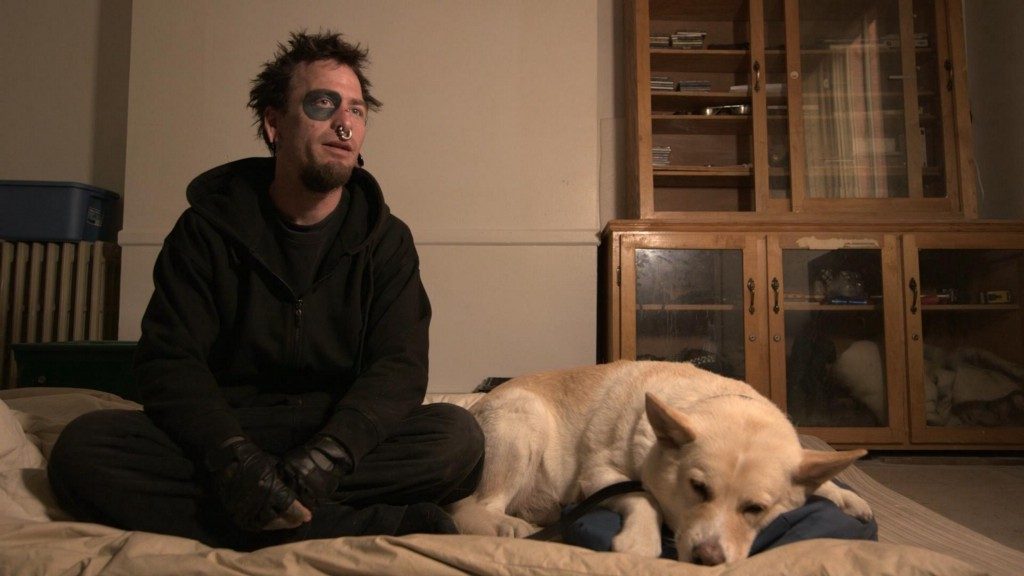Hélène Choquette has been dedicating herself to making documentaries on social and political issues since she made her debut as a camerawoman and photographer in 2001. She co-directed the award-winning series “Marcé Jean-Talon” in 2004. In 2006, Choquette traveled to Belarus, where she shot “The Children of Chernobyl,” a film highlighting the 20th Anniversary of the worst nuclear disaster in history. In 2006, “The Refugees of the Blue Planet” was among the first documentaries ever produced revealing the situation of environmental refugees across the world. This award-winning film was sold in over 12 countries including Spain, South Korea, and Italy. (Press materials)
“A Dog’s Life” will premiere at the 2016 Hot Docs Film Festival on May 4.
W&H: Describe the film for us in your own words.
HC: The homeless have become part of the urban decor and we tend to become insensitive to their struggles. I chose to look at them through their intimate and unique relationship with their dogs. I thought that our natural empathy for these pets might help us develop the same empathy for their owners as well.
W&H: What drew you to this story?
HC: I was seeking an approach to talk about homelessness in a different way. One day I saw a young man overdosing on the street and his dog was brought to a shelter before he woke up. I imagined how he would feel waking up not knowing where his only friend was. Being haunted by this thought even weeks later, I realized I had found my story.
W&H: What do you want people to think about when they are leaving the theater?
HC: I’d like people to stop portraying the homeless as old drunks and dirty men on the corner of the street. The documentary presents eight very different homeless people, men and women, aged between 20 and 70 years old.
I’d also like people to accept the fact that some human beings will never fit in our society of rules. We have to respect the marginal, making sure they are doing fine and looked after as much as we care about their dogs.
W&H: What was the biggest challenge in making the film?
HC: [The biggest challenge was] keeping track of the protagonists and dealing with the fact that I’m not a social worker. As a documentary filmmaker, I empathize with them and sometimes help them, but my main role is to document their lives without becoming an actor in it.
W&H: How did you get your film funded?
HC: At first, the broadcaster CBC came on board for a 52-minute long film, and then Telefilm Canada and the SODEC, two governmental organizations promoting art and culture in Canada, came in to contribute financially. My valiant producers and precious collaborators accepted to volunteer for the extra time it would take us to make a feature version.
W&H: What’s the biggest misconception about you and your work?
HC: I often film people who are not easy to bond with at first sight, people who hardly have a voice because of their situation or condition. Six months of research were needed to get full confidence of “A Dog’s Life’s” main protagonists. It’s always important to me that every segment of my films flow naturally.
The viewers shouldn’t feel the efforts it sometimes took us to get some of these testimonies or catch some scenes from life. This apparent simplicity sometimes leads to the misconception that my documentaries are easy pieces to do. In the case of “A Dog’s Life,” some viewers didn’t measure the moral strength and determination it took all our crew members to immerse ourselves in the lives of eight shattered people for a year. At the end of a shooting day, the protagonists were not going back to happy lives.
W&H: What’s the best and worst advice you’ve received?
HC: I only remember the best advice I’ve received — always keep an open mind for unknown paths you didn’t anticipate. This is when magic happens.
W&H: What advice do you have for other female directors?
HC: Believe in your potential. I started as a camerawoman and production manager on documentaries. The producer I was working for knew that aspiration was to direct documentaries, but he argued that I was too efficient at coordinating others. He was openly saying that women were better in the office, and men on set.
I finally quit the job and started to look for people who would believe in my potential as a director. It was scary, but it was worth it in time. Since that experience I never felt any discrimination and I want to believe that things have changed in the past 20 years!
W&H: Name your favorite woman-directed film and why.
HC: This year I had an enormous love for “Mustang” directed by Deniz Gamze Ergüven. It tells the story of five sisters growing up in a conservative village in Turkey. Ergüven was able to show the essence of femininity, the awakening of sexuality, the delicacy of teenager bodies, imagination, and boredom proper to adolescence, but also rebellion and sexism in a powerful film full of tenderness and sensuality.







